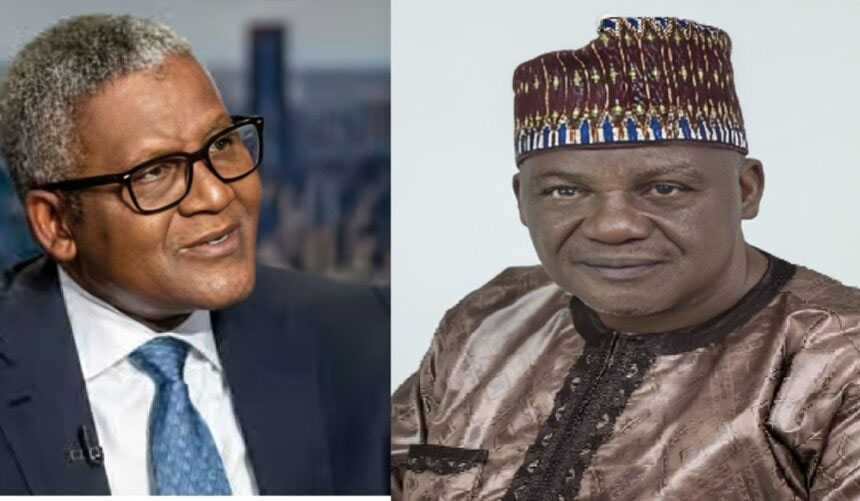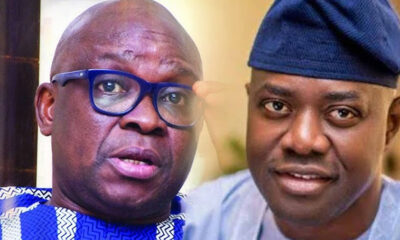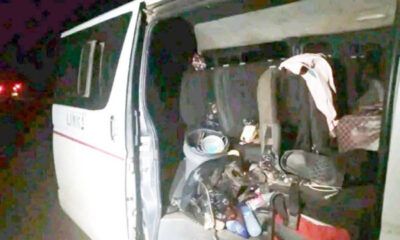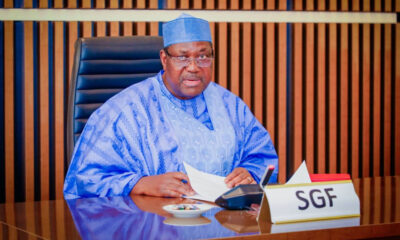Opinion
When I forged my exam record

7 IPOB supporters regain freedom as court fines police N130m
Many feared killed as petrol tanker explodes in Lagos
NAMA, MAN worry over slow development of Nigeria’s auto industry
When I forged my exam record
Opinion
Assertion, Retraction, and Responsibility: Lessons from the Kailani–Dangote Episode

By Mudashir ‘Dipo’ Teniola
The controversy surrounding Prof. Kailani’s remarks about Aliko Dangote did not arise from a disagreement over economic policy, regulatory frameworks, or refinery pricing. It arose from something far more fundamental: unguarded personal assertions made on national television.
In a clip that went viral, Prof. Kailani did not interrogate the Dangote Refinery through data or documented regulatory breaches. He did not present evidence-based arguments on monopoly, market dominance, or institutional capture. Instead, he made sweeping claims about Dangote’s character, suggested prior knowledge of how Dangote earned his wealth in Port Harcourt, implied habitual intimidation of regulators, and concluded broadly that “nobody is clean.”
Those statements were not policy critique—they were personal insinuations. That distinction matters legally, ethically, and journalistically.
From Analysis to Allegation
Public analysts and academics occupy a privileged position in society. Their words carry weight because they are presumed to be anchored in evidence, expertise, and restraint. The moment such figures move from critiquing systems to asserting personal wrongdoing, the burden of proof changes entirely.
Arguing that a company is monopolistic requires data: market share figures, barriers to entry, pricing behavior, and regulatory analysis. Claiming to “know” how a businessman made his wealth is an allegation of impropriety, not analysis. In any serious society, the two cannot be confused.
Why the Retraction Happened
When Dangote’s legal team reportedly demanded that Prof. Kailani substantiate his claims or face a ₦100 billion defamation suit, the response was swift: a return to the same television platform, followed by a full retraction and apology.
READ ALSO:
- NANS Declares National Protest Against Implementation of Tax Reform Law
- Labour Party Reacts to Peter Obi’s Defection to ADC, Calls 2023 Candidacy ‘Mistake’
- MURIC Calls for Arrest of Maazi Kanayo Over Alleged Threats to Igbo Muslims
This sequence is instructive. The retraction was not prompted by new evidence or deeper reflection; it was prompted by a demand for proof. That alone signals that the original claims lacked verifiable support.
This is not a case of power silencing truth—it is a case of assertions collapsing under scrutiny.
The Wider Context Nigerians Must Acknowledge
The episode occurred against the backdrop of deep public suspicion in Nigeria’s oil sector. For decades, entrenched interests have been accused of frustrating local refining and sustaining import dependence. The Dangote Refinery is widely perceived as a disruptive force challenging that status quo.
The resignation of former NMDPRA boss Farouk amid public controversy further sharpened perceptions. Dangote made allegations of obstruction; the regulator stepped aside without public defense. Dangote did not retract his claims.
Against this backdrop, Prof. Kailani’s comments were interpreted by many Nigerians not as neutral analysis but as partisan intervention—delivered through insinuation rather than evidence. In such a climate, perception carries consequences.
The Real Lesson
Two truths must be held simultaneously if Nigeria’s public discourse is to mature.
First, economic power does not confer immunity from scrutiny. No private individual, however wealthy, should be beyond questioning in a democracy.
Second, scrutiny must be disciplined. Analysts do not have license to damage reputations through vague insinuations, historical allusions, or claims that cannot withstand legal examination.
A society where powerful individuals cannot be questioned drifts toward authoritarianism. A society where reputations can be casually destroyed drifts toward chaos. Nigeria risks both when standards collapse.
Conclusion
Prof. Kailani was not silenced for asking difficult questions. He retreated because he made claims he could not defend. That distinction must be preserved if public debate is to remain credible.
If Nigerians desire serious conversations about monopoly, regulation, and economic justice, those conversations must be rooted in facts, not fragments; in evidence, not emotion. In a serious country, power answers questions—and analysts choose their words with care. Anything less weakens both truth and trust.
Assertion, Retraction, and Responsibility: Lessons from the Kailani–Dangote Episode
Opinion
How a Misleading Channels TV Headline Reignited Nigeria’s Religious Tensions

How a Misleading Channels TV Headline Reignited Nigeria’s Religious Tensions
In Southwestern Nigeria, the historic heartland of the Yoruba ethnic group, religious coexistence was once deeply ingrained in everyday life. Families were often religiously heterogeneous yet harmonious: a Muslim husband with a Christian wife, parents of different faiths raising children who chose Islam, Christianity or indigenous beliefs. Religious festivals were commonly celebrated together, reinforcing social cohesion.
This tradition of harmony began to erode significantly after the introduction of the Structural Adjustment Programme (SAP) in 1986 by the military government of General Ibrahim Badamasi Babangida, under the influence of the World Bank and the International Monetary Fund (IMF). SAP policies—such as reduced government spending on education and social services, trade liberalisation and currency devaluation—triggered soaring inflation, weakened purchasing power and widespread economic hardship.
As livelihoods collapsed, some Nigerians turned to corrupt practices, while others found opportunity in the rise of commercialised religious enterprises, complete with aggressive business models and intense competition for followers. This shift contributed to rising intra- and inter-religious tensions, particularly in a region once celebrated for tolerance.
The erosion of harmony in the Southwest mirrored growing religious conflicts across Nigeria, especially between Christians and Muslims. Scholars and analysts have long warned that the media plays a decisive role in either escalating or de-escalating such conflicts. In his 2006 pamphlet Voices of War: Conflict and the Role of the Media, Andrew Puddephatt observed that media outlets can either inflame violence through partisan reporting or promote peace through independence and responsible framing.
READ ALSO:
- Carter Efe Slams Peller’s Suicide Attempt, Urges Him Back to Streaming After Jarvis Breakup
- Breaking: Popular Nigerian Actress Allwell Ademola Dies at 43
- Labour Party Urges Tinubu to Sign Executive Order on Local Government Autonomy
These concerns resurfaced sharply on 24 December 2025, when a mosque in Maiduguri, Borno State, was bombed during Maghrib prayers, killing worshippers. International and local media clearly identified the target as a mosque. Headlines from BBC, Al Jazeera, Deutsche Welle, The Cable, The Guardian (Nigeria) and Daily Trust all referenced the mosque or Muslim worshippers.
However, Channels Television published the headline: “BREAKING: Many feared dead as bomb blast rocks Maiduguri on Christmas eve.” The omission of the mosque and the emphasis on “Christmas Eve” drew widespread criticism for being misleading and inflammatory.
Reacting on X, commentator Boss Kitty Kitty (@Aashfinn) condemned the framing, warning that it fed a dangerous “Christian genocide” narrative, despite evidence that terrorism in Nigeria targets victims indiscriminately. The Muslim Public Affairs Centre (MPAC) also issued a strong statement, accusing Channels Television of editorial bias, deliberate omission of Muslim identity, and the weaponisation of language to provoke religious tension.
MPAC argued that the headline change—adding “Christmas Eve” after initial publication—suggested a calculated attempt to drive engagement at the expense of national unity. The organisation further alleged a pattern in which Muslim victims are anonymised while narratives that heighten suspicion against Islam are amplified.
Media scholars describe this practice as media bias and confirmation bias, where editorial choices reinforce preconceived narratives while excluding crucial context. Studies consistently show that headlines shape public perception, especially in an era where many readers share stories based solely on headlines without reading full reports.
The controversy came just a day after President Bola Ahmed Tinubu, in his Christmas Day 2025 broadcast, reaffirmed the government’s commitment to religious freedom, protection of all faiths, and peaceful coexistence. While the President sought to calm tensions and promote dialogue, critics argue that irresponsible media framing risks undermining these efforts.
As one commentator, @mrabdulreacts, noted on TikTok: “Narratives can be more dangerous than bullets… misleading headlines can destroy trust for generations.” The Maiduguri bombing coverage has therefore reignited urgent questions about journalistic responsibility, religious sensitivity, and whether sections of the Nigerian media are contributing to division in an already fragile society.
How a Misleading Channels TV Headline Reignited Nigeria’s Religious Tensions
Opinion
When a Tax Law is an illegality, By Farooq Kperogi

When a Tax Law is an illegality, By Farooq Kperogi
What began as a routine legislative reform of the Nigerian tax system by the Bola Tinubu administration has transmogrified and metastasized into an allegation of unexampled transmutation of a duly passed law to an illegality.
It’s by now well known that a law passed by the National Assembly and assented to by the president may have been materially altered after assent and then presented to the public as binding law. If this allegation is established beyond all shadows of doubt, Nigeria would be confronting the specter of an illegality fraudulently constituted as law.
Interestingly, the discovery wasn’t brought to public notice by secretive, conscientious whistleblowers in the bureaucracy or from eagle-eyed civil society audits. It came from within the legislature itself.
A member of the House of Representatives, Abdulsammad Dasuki, raised a point of privilege after personally comparing the harmonized bill passed by both chambers with the version of the tax laws published in the official gazette. He found that the documents did not match.
His discovery was the product of days of rigorous, studious and painstaking examination of Votes and Proceedings, committee harmonization records and the gazetted text. He realized that he voted for one thing, but the country was being governed by another.
That intervention sparked a chain reaction. Other lawmakers requested certified true copies of the assented bill to verify whether the president had signed the same text that was now in circulation. According to multiple reports, those requests were denied.
The refusal to release certified copies deepened suspicion and transformed what could have been dismissed as a clerical misunderstanding into a full-blown institutional crisis.
When legislators are blocked from seeing the law that they passed and that the president signed, the issue verges on criminal constitutional transgression that must not be swept under the carpet.
While full official disclosure is still pending, several discrepancies have been repeatedly cited by lawmakers, journalists and civil society groups. These include expansions of the discretionary powers of tax authorities beyond what the National Assembly approved, alterations to reporting and oversight obligations, changes in enforcement thresholds, and adjustments that potentially increase executive control over revenue administration.
READ ALSO:
- AFCON 2025: Mali Fight Back to Draw With Hosts Morocco in Rabat
- AFCON 2025: Salah’s Spot Kick Seals Egypt’s Knockout Spot Against South Africa
- 2026 World Cup: FIFA Throws Out Nigeria’s Appeal Against DR Congo
These are not innocent, unintentional clerical slips. They go to the meaning, scope and intent of the law. In short, they change who has power to tax Nigerians, how that power is exercised and to whom it is accountable.
The distinction matters. All legislative systems experience clerical errors. A misplaced word or a misnumbered section does not invalidate a statute. But when alterations confer new powers, remove safeguards, or shift institutional balance, they cross from error into illegality.
A gazette cannot lawfully create what the legislature did not enact or what the president did not assent to. Publication is supposed to merely provide evidence of the existence of the law. It can invent a law that hasn’t been passed.
The official responses so far have been evasive and contradictory. Government representatives initially insisted that there was only one authentic version of the law and that claims of alteration were partisan, ill-natured rumors. But that posture is difficult to reconcile with subsequent developments.
For example, a December 26, 2025, press statement signed by Akin Rotimi, House Spokesman and Chairman of the House Committee on Media and Public Affairs, said the National Assembly has now constituted an ad hoc committee to investigate the sequence of events from harmonization to assent to gazetting.
More tellingly, Rotimi said, the leadership of the legislature has directed that the tax laws be re-gazetted and that certified true copies of the versions duly passed by both chambers be issued.
Re-gazetting is not a neutral act. It is an implicit admission that the existing gazette cannot be confidently treated as an accurate record of legislative intent. If nothing were amiss, there would be nothing to authenticate. The attempt to frame this as a routine administrative clarification rings hollow. Laws are not re-gazetted in the absence of doubt about their authenticity.
Supporters of the government have urged the public to trust the president’s integrity and to avoid speculation. The issue, however, is not whether the president is personally trustworthy but whether the law now being enforced is the law he signed. No amount of rhetorical reassurance can substitute for producing the signed text and allowing a side-by-side comparison with the gazetted version.
There is no precedent in the world that I have found for this kind of illegality. In the United States, the much-cited Deficit Reduction Act controversy of 2006 involved a discrepancy between House and Senate versions due to a clerical transmission error. The president signed the enrolled bill that was presented to him.
Courts upheld it under the enrolled bill doctrine, which treats the signed text as conclusive. Crucially, there was no claim that the law was altered after presidential assent.
READ ALSO:
- Cancer Patient Appeals for Second Wife for Husband, Cites Sexual, Health Challenges
- ACF Awaits Full Details Before Commenting on US–Nigeria Airstrikes in Sokoto
- FG Confirms Debris from US–Nigeria Joint Airstrikes on ISIS in Sokoto Fell in Offa
In the Philippines, in 1964, there was a case where the wrong version of a bill was signed by the president. Legislative leaders later disowned the enrolled copy and treated the signature as invalid. Again, the error occurred before or at assent, not after. Once discovered, it was confronted as a mistake. It wasn’t normalized.
Nigeria’s case, if the allegations are borne out, is more disturbing. Here, the claim is that the president signed the correct bill but that the authoritative law published afterward materially departs from it.
Comparative constitutional practice offers no comfort here. Stable legal systems do not recognize post-assent textual mutation as valid law. Where gazetting errors occur, they are corrected. They do not become the basis for enforcement.
This raises an unavoidable question: why would anyone alter a law after it has been passed and signed? Motives can only be inferred from circumstantial evidence, but the inferences are troubling.
Expanding the powers of tax authorities in a period of fiscal stress creates incentives for bureaucratic overreach. Removing or weakening legislative-oversight provisions reduces accountability. Centralizing discretion in the executive arm simplifies revenue extraction while insulating decision makers from scrutiny. These are not abstract possibilities. They align closely with the specific alterations that have been alleged.
There is an even more unsettling implication. If a major tax reform law can be altered after assent without immediate detection, what confidence can citizens have in the integrity of other statutes? Nigeria has passed hundreds of laws over the years, many of them technical, complex and rarely scrutinized line by line after gazetting. The discovery of this discrepancy raises the chilling possibility that post-assent alterations may not be unprecedented in practice.
That possibility should alarm every Nigerian regardless of political affiliation. Law is the foundation of collective life. If the text of the law is unstable, if it can be surreptitiously modified after constitutional procedures have been completed, then legality itself becomes provisional. Governance slides from rule of law to rule by document manipulation.
The seriousness of this violation cannot be overstated. If officials altered the tax law knowingly, they did not merely breach administrative rules. They subverted the Constitution. Such conduct would amount to forgery, abuse of office and an assault on democratic sovereignty. It would mean that Nigerians are being taxed under provisions that were never lawfully enacted.
This is why a thorough, transparent investigation is not optional. It must establish a clear documentary chain: the harmonized bill passed by both chambers, the exact text transmitted for assent, the document signed by the president and the version published in the gazette. Any divergence must be accounted for, step by step, with named responsibility. Institutional reviews that end in vague recommendations will not suffice.
If culpability is established, punishment must be severe. Anything less would invite repetition. As I always say, there is no greater enabler of habitual relapses into the same crime than the absence of consequences for committing the crimes.
The alteration of law after assent is not a victimless bureaucratic shortcut. It is a constitutional crime with nationwide consequences. Deterrence requires more than quiet corrections. It requires accountability that is visible, proportionate and unmistakable.
This episode can either be buried under procedural language and political loyalty, or it can become a moment of constitutional self-correction. A tax law that is an illegality cannot be the foundation of fiscal reform. The integrity of the lawmaking process is itself a public good. Without it, no reform, however well intentioned, can claim legitimacy.
When a Tax Law is an illegality, By Farooq Kperogi
Kperogi is a renowned columnist and United States-based Professor of Journalism
-

 metro3 days ago
metro3 days agoIbadan Explosion: Fayose Releases Documents, Claims Makinde Got ₦50bn from FG
-

 metro3 days ago
metro3 days agoPlateau Kidnappers Demand ₦1.5m Each as 28 Muslim Travellers Remain in Captivity
-

 metro2 days ago
metro2 days agoNiger Delta Crackdown: Army Seizes ₦150m Stolen Oil, Arrests 19 Suspects
-

 Sports2 days ago
Sports2 days agoCristiano Ronaldo Wins Best Middle East Player at 2025 Globe Soccer Awards in Dubai
-

 Sports2 days ago
Sports2 days agoAnthony Joshua injured as two die in fatal Lagos-Ibadan Expressway crash (plus photos)
-

 metro1 day ago
metro1 day agoMrs. Regina Akume Urges SGF George Akume to Return to Christianity Amid New Marriage
-

 metro3 days ago
metro3 days agoBello Turji Not Killed in US Airstrikes, Security Expert Debunks Reports
-

 metro1 day ago
metro1 day agoTwo Close Aides of Anthony Joshua Identified as Victims of Fatal Crash







